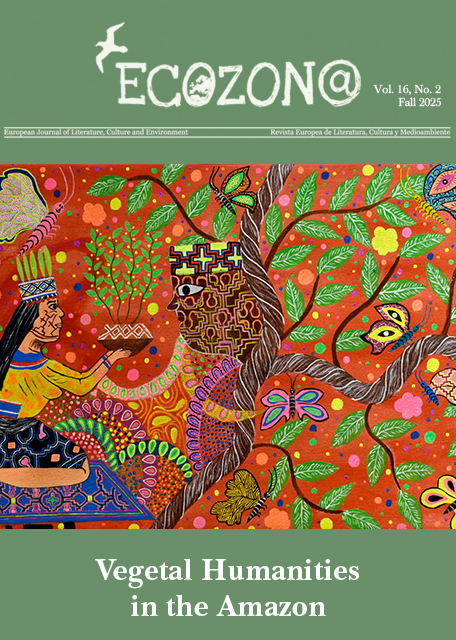Border gnoseology: Akwaeke Emezi and the Decolonial Other-than-Human
DOI:
https://doi.org/10.37536/ECOZONA.2022.13.2.4669Parole chiave:
trans, tranimality, Igbo cosmology, sacrality, Akwaeke EmeziAbstract
The underlying assumption when speaking about the postcolonial nonhuman is that the other-than-human refers to what could be called, broadly speaking, the “natural world,” as opposed to “the human-as-Man,” but still usually understood in (Western) secular terms. Nevertheless, from the perspective of African onto-epistemologies, the nonhuman can also refer to the spiritual world, or to the diverse assemblages between the “natural,” the human and the sacred. Freshwater (2018) and Dear Senthuran. A Black Spirit Memoir (2021), by Akwaeke Emezi, open up a space of “border gnoseology,” where contemporary Anglo-American discourses on transsexuality intersect with African ontologies and epistemologies, specifically with the well-known figure of the ogbanje and the sacred python as an avatar of Ala, the Earth goddess in Igbo culture, to produce a radically subversive embodied subjectivity. The ideas of movement, transing, tranimalcy and (transatlantic) crossing conspire to dismantle conventional Eurocentric humanist views on selfhood and identity. Reading Emeke on their own terms also requires revisiting alternative notions of temporality beyond secular, cisheteronormative, modern time, as well as an understanding that the sacred and the spiritual are indeed essential to the worldview and the processes of subjectivation of millions of people across the globe.
Downloads
##submission.downloads##
Pubblicato
Fascicolo
Sezione
Licenza
Authors who publish with this journal agree to the following terms:
a) Authors retain copyright and grant the journal right of first publication with the work simultaneously licensed under a Creative Commons Attribution License that allows others to share the work with an acknowledgement of the work's authorship and initial publication in this journal (CC BY-NC for articles and CC BY-NC-ND for creative work, unless author requests otherwise.
b) Authors are able to enter into separate, additional contractual arrangements for the non-exclusive distribution of the journal's published version of the work (e.g., post it to an institutional repository or publish it in a book), with an acknowledgement of its initial publication in this journal.
c) Authors are permitted and encouraged to post their work online (e.g., in institutional repositories or on their website) prior to and during the submission process, as it can lead to productive exchanges, as well as earlier and greater citation of published work (See The Effect of Open Access).










